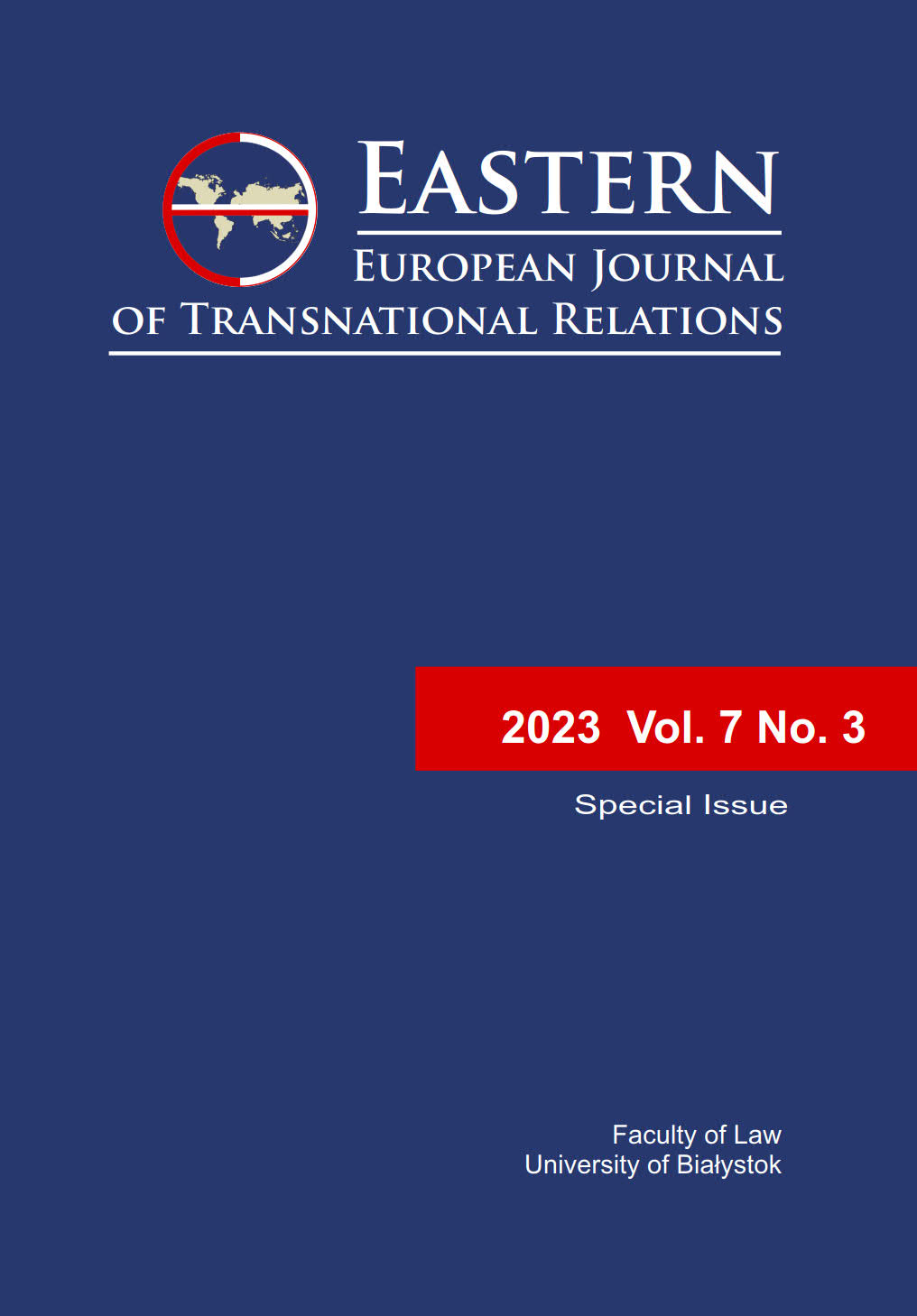The European Committee of Social Rights and cooperation between the Council of Europe and the European Union in social issues. Selected issues
DOI:
https://doi.org/10.15290/eejtr.2023.07.03.04Keywords:
Council of Europe, European Union, European Social Charter, European Committee for Social RightsAbstract
The aim of the article is to demonstrate that the ECSR remains one of the important organizational factors of the formally regulated cooperation of the Council of Europe and the European Union in the sphere of social fundamental rights. The analysis is dominated by the dogmatic-legal method. The paper includes an analysis of the formal basis of cooperation between the CoE and the EU, the specificity of their cooperation in the field of social rights, the analysis of the ECSR as a body of the ESC and its activity in cooperation with EU structures. The analyses carried out show that the framework of cooperation between the two organizations is formalised and the ECSR finds its place within it. At the same time, it has been shown that the Committee's role in cooperation with the EU and in promoting ESC standards - in view of the autonomy of the two organizations' legal systems - remains important, particularly at the level of organizational cooperation with EU institutions and bodies.
Downloads
References
Activity Report 2010, available at: https://rm.coe.int/CoERMPublicCommonSearchServices/DisplayDCTMContent?documentId=090000168048910f.
Activity Report 2014, available at: https://rm.coe.int/CoERMPublicCommonSearchServices/DisplayDCTMContent?documentId=090000168047eebb .
Activity Report 2015, available at: https://rm.coe.int/CoERMPublicCommonSearchServices/DisplayDCTMContent?documentId=09000016805ab9c7.
Activity Report 2016, available at: https://rm.coe.int/activity-report-ecsr-2016-final-17-03-2017/1680701072.
Activity Report 2019, available at: https://rm.coe.int/activity-report-2019-of-the-european-committee-of-sosial-rights/16809fcf8b.
Additional Protocol to the European Social Charter Providing for a System of Collective Complaints (ETS No. 158), available at: https://rm.coe.int/168007cdad
Barcz, J. (2008). Traktat z Lizbony. Główne reformy ustrojowe Unii Europejskiej. Warszawa 2008.
Charter of Fundamental Rights of the European Union, OJ C 326, 26.10.2012.
Co-operation between the Council of Europe and the European Union. Overview of arrangements for co-operation between the Council of Europe and the European Union, DER/Inf (2018) 2, 31 May, 2018, available at: https://rm.coe.int/der-inf-2018-2-overview-of-coe-eu-cooperation-mechanisms/16808e4706.
Council Directive 1999/70/EC of 28 June 1999 concerning the framework agreement on fixed-term work concluded by ETUC, UNICE and CEEP, OJ L 175, 10.7.1999
Council Directive 92/85/EEC of 19 October 1992 on the introduction of measures to encourage improvements in the safety and health at work of pregnant workers and workers who have recently given birth or are breastfeeding (tenth individual Directive within the meaning of Article 16 (1) of Directive 89/391/EEC), OJ L 348, 28.11.1992.
de Schutter, O. (2021). Europejski Filar Praw Społecznych a rola Europejskiej Karty Społecznej w porządku prawnym Unii Europejskiej. Rada Europy. Available at: https://rm.coe.int/the-epsr-and-the-role-of-the-esc-in-the-eu-legal-order/1680a1cf17.
Doliwa-Klepacki, Z. (1999). Encyklopedia organizacji międzynarodowych. Warszawa.
European Convention on Human Rights, available at: https://www.echr.coe.int/documents/convention_eng.pdf.
Gadkowski, A. (2014). Europejski Komitet Praw Społecznych w systemie organów traktatowych międzynarodowej ochrony praw człowieka. Adam Mickiewicz University Law Review, 3, 71-93, available at: https://hdl.handle.net/10593/12646.
Gadkowski, A. (2016). Charakterystyka quasi-sądowych funkcji Europejskiego Komitetu Praw Społecznych w procesie rozpatrywania skarg zbiorowych. Ruch Prawniczy, Ekonomiczny i Socjologiczny, 78(3), 35-48. https://doi.org/10.14746/rpeis.2016.78.3.4.
Judgment of the Court (Fourth Chamber) of 20 September 2007, Case C-116/06, ECLI:EU:C:2007:536.
Judgment of the Court (Grand Chamber) of 15 April 2008, Case C-268/06, ECLI:EU:C:2008:223.
Memorandum of Understanding between the Council of Europe and the European Union, available at: https://rm.coe.int/mou-en/1680597b32.
Menkes, J., & Wasilkowski, A. (2010). Organizacje międzynarodowe. Prawo instytucjonalne. Warszawa.
Polakiewicz, J. (2021). A Council of Europe perspective on the European Union: Crucial and complex cooperation. Eur. World. 5(1), 1-19. http://doi.org/10.14324/111.444.ewlj.2021.30.
Świątkowski, A. M., & Wujczyk, M. (2016). Karta Praw Społecznych Rady Europy jako szansa ustanowienia jednolitej koncepcji obywatelstwa Unii Europejskiej. Roczniki Administracji i Prawa, 16(2), 409-436, avaliable at: https://rocznikiadministracjiiprawa.publisherspanel.com/resources/html/article/details?id=179149.
The relationship between European Union law and the European Social Charter. Working Document, 15 July 2014, available at: https://rm.coe.int/16806544ec.
Treaty on the European Union, OJ, C 202, 7 June 2016.
Treaty on the functioning of the European Union, OJ, C 202, 7 June 2016.
van Vooren, B., & Wessel, R.A. (2014). EU External Relations Law. Text, Cases and Materials. Cambridge University Press.
Downloads
Published
Issue
Section
License

This work is licensed under a Creative Commons Attribution 4.0 International License.
1. The Author declares that he or she has created the written work and holds exclusive and unlimited copyright /both moral and property rights/ and guarantees that no third parties have rights to the work.
2. In the view of the Copyright and Related Rights Act, a work must fulfill the following criterion:
a) be a manifestation of creative work,
b) have an individual character („author’s personal stamp”),
c) have a set form.
3. The Author declares that the text has not been previously published (under the same or different title, or as a part of another publication).
4. The Author allows (grants a non-exclusive license) the publishing house of University of Białystok to use the scholarly text to:
- preserve and multiply by means of any technique; save in a digital form with no limitations as to the manner and form of digital preservation;
- upload online with no limitations as to the place and time of access.
5. The Author grants consent for editorial changes made in the work.
6. The Author grants the University of Białystok rights free of charge for the duration of property copyright with no territory limits. The University has the right to grant sublicenses in the acquired rights.
7. Granting a non-exclusive license allows the Author to preserve their rights and allows other parties to make use of the work according to sublicensing agreement with provisions identical as those of Attribution 4.0 Internacional License (CC BY 4.0), available online at: https://creativecommons.org/licenses/by/4.0/.
8. The Agreement has been concluded for an indefinite period of time.
9. Because of costs born in preparation of the work for publishing, the Parties oblige themselves to act in good faith and refrain from declining to grant licenses.
10. To all matters not settled herein, provisions of the Civil Code and Copyright and Related Rights Act of 1994, February 4 shall apply.
11. All disputes shall be resolved by a court of local jurisdiction for the place of seat of University of Białystok.


